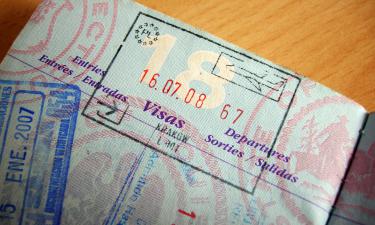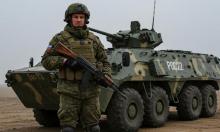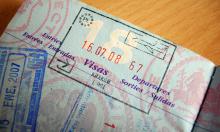Iraqis vote for first parliament amid security
Iraqis voted in a historic parliamentary election Thursday, with strong turnout reported in Sunni Arab areas that had shunned balloting last January, bolstering U.S. hopes of calming the insurgency enough to begin withdrawing its troops. Several explosions rocked Baghdad as the polls opened, including a large one near the heavily fortified Green Zone. A civilian was killed when a mortar shell exploded near a polling station in the northern city of Tal Afar, and a bomb killed a hospital guard near a polling station in Mosul. But violence overall was light and did not appear to discourage Iraqis, some of whom came to vote wrapped in their country's flag on a bright, sunny day.
An alliance of Shiite religious parties, which dominate the current government, was expected to win the largest number of seats, but not enough to form a new administration without a coalition with rival groups. That could set the stage for lengthy and possibly bitter negotiations to produce a government.
Up to 15 million Iraqis were electing 275 members of the first full-term parliament since Saddam Hussein's ouster from among 7,655 candidates running on 996 tickets, representing Shiite, Sunni, Kurdish, Turkomen and sectarian interests across a wide political spectrum. Iraqis do not vote for individual candidates, but instead for lists, or tickets, that compete for the seats in each of the 18 provinces.
Some preliminary returns were expected late Thursday, but final returns could take days, if not weeks. Sunnis appeared to be turning out in large numbers, even in insurgent bastions such as Ramadi and Haqlaniyah, in an effort to curb the power of Shiite clerical parties who now control the government. Major insurgent groups had promised not to attack polling stations, and some polling centers in Ramadi were guarded by masked gunmen.
"I came here and voted in order to prove that Sunnis are not a minority in this country," said lawyer Yahya Abdul-Jalil in Ramadi. "We lost a lot during the last elections, but this time we will take our normal and key role in leading this country." Teacher Khalid Fawaz in the former insurgent stronghold of Fallujah said he also participated "so that the Sunnis are no longer marginalized."
And 28-year-old college student Yassin Mohammed Samarra said he voted so that "no particular (religious) sect controls the country." In Fallujah, which was overrun by U.S. forces in November 2004, hundreds packed a high school polling station, with many saying they saw the vote as a way to get rid of the Americans and the Shiite-dominated government.
"It's an extremist government we would like an end to the occupation," said Ahmed Majid, 31. "Really the only true solution is through politics. But there is the occupation and the only way that will end is with weapons."
Shiite parties had urged their followers to turn out in large numbers, too. The country's leading Shiite cleric, Grand Ayatollah Ali al-Sistani, told Shiites to support candidates who defend their principles, a veiled warning against turning toward secular political movements.
"They are clerics, and clerics do not steal our money," said Abbasiya Ahmad, 80, as she voted for the Shiite religious bloc, the United Iraqi Alliance, at a Baghdad polling station. "We want people who protect our money."
The Bush administration hopes the new parliament will include more Sunni Arabs to help establish a government that can lure other Sunnis away from the insurgency. Such a development might make it possible for the United States and its partners to start to draw down their troops next year.
Security was tight, with tens of thousands of Iraqi soldiers and police guarding polling stations, with U.S. and other coalition forces standing by in case of trouble. U.S. troops and bomb-detecting dogs checked thousands of polling stations before handing over control to Iraqi police. A nationwide traffic ban was in effect to prevent suicide bombs.
Turnout was also brisk in the northern cities of Mosul and Kirkuk, especially in Kurdish districts.
"This is the day to get our revenge from Saddam," said Kurdish voter Chiman Saleh, a Kirkuk housewife who said two of her brothers were killed by the ousted regime.
Ethnic tensions in Kirkuk, claimed by Arabs, Kurds and Turkomen, would be seen, however. Norjan Adel, a pollwatcher for the Turokman Front, complained of iregularities by the Kurds, including multiple voting.
She prevented a Kurdish policeman from entering the station carrying a flag of the self-ruleds Kurdish region, saying "I only recognize the Iraqi flag and any other flag is a joke."
In Baghdad's predominantly Sunni Arab Azamiyah district, the head of one polling station said that by midday, about one-third of the 3,500 registered voters had turned out. In January, many polling stations in Azamiyah didn't even open.
At Azamiyah's al-Nuaman school, the street on either side of the building was blocked with cement barricades and razor wire. People arrived on foot in small numbers, women were not allowed to take their bags inside, and cell phones were banned.
Voters at the station had little enthusiasm for the Shiite coalition that has governed the country since April 28. In January, few people in Azamiyah voted and some polling stations didn't even open, reports the AP. I.L.
Subscribe to Pravda.Ru Telegram channel, Facebook, RSS!




